 |
![]()
From the
Dean
Colleagues,

This month we will welcome two ‘new’ faculty to our College. Dr. Jian-Kang Zhu is joining us with an appointment in the Departments of Horticulture and Landscape Architecture and Biochemistry. Dr. Mike Scharf is joining our Department of Entomology. Dr. Zhu’s work is in the areas of epigenetics—the study of heritable changes in gene expression that are not due to changes in DNA sequence—and abiotic stress tolerance. Dr. Scharf works in the area of molecular and applied insect toxicology. (Read more on both Dr. Zhu and Dr. Scharf in this issue of InFocus.) Suffice it to say, these are two exceptional mid-career faculty members who will make their impact very quickly on this College. And, the investments in our College that were key in recruiting these two faculty members are worth discussing.
Dr. Zhu was recruited under a program called ‘Leading Faculty’ that was created by President Córdova to help bring exceptional faculty to our campus who can help catalyze existing strengths, moving an existing area to even greater levels of prominence and/or helping launch a new area that is recognized to be important to Purdue in the future. Bob Joly prepared an excellent proposal that pointed out the strength our College has in plant biology and the importance of the science of epigenetics moving forward. Many proposals from across campus were submitted to this program in the fall of 2009, and we were fortunate to have our proposal to recruit Dr. Zhu approved. In the Leading Faculty program, our College invests an assistant professor faculty line, and the rest of the salary and the start-up package comes from the central campus budget, hence the new investment in our College.
Dr. Scharf was recruited to fill the O. Wayne Rollins/Orkin Chair in Molecular Physiology for Urban Entomology. The chair was funded with a $1.5 million gift from the O. Wayne Rollins Foundation, which was established by and named for the late owner and president of Orkin Pest Control. This endowment created a dedicated faculty program focused on urban insect pests, significantly raising the stature of Purdue’s urban entomology program and underscoring the program’s strong reputation. The investment supporting the chair will provide endowment income to support Dr. Scharf’s program and strengthen our long-standing partnership with industry. This unique partnership played an important role in bringing Dr. Scharf to Purdue.
The combination of our existing faculty talent and these exciting new hires further strengthens our research portfolio and has given us the opportunity to acquire other investments for the College to enhance our core capabilities and infrastructure. We have been able to remodel laboratories in the Horticulture and Biochemistry buildings as well as in Whistler Hall. Furthermore, we have enhanced our sequencing capabilities and will be able to provide bioinformatics support to many scientists in the very near future. The construction and laboratory moves required by all this have been and continue to be very disruptive, and all involved in these moves have my deepest thanks for their continuing patience through this process. That said, these kinds of investments in better laboratory space for faculty beyond those we are bringing in, new equipment, and greatly enhanced core facility capabilities will pay big dividends for our College in the future.
In addition to these two individuals, we are very excited about the 10 early career faculty searches (assistant or associate level) that are active right now. When you look at combining these on-going early career hires with the periodic opportunity to bring in exceptional mid-career faculty such as Dr. Zhu and Dr. Scharf, you have to be very excited about the future of the College given the quality of the faculty we have been able to attract.
I wish each of you much success as we move toward the end of the semester!
All the best,

News Around Purdue Agriculture
College of Agriculture welcomes two new faculty members
 Dr. Mike Scharf, O. Wayne Rollins/Orkin Chair in Molecular Physiology and Urban Entomology, Department of Entomology. Dr. Scharf earned his bachelor's degree in entomology, a master's in urban entomology and a doctorate in insect toxicology/urban entomology, all from Purdue. He comes to Purdue from the University of Florida, where he had been on the faculty since 2004. Dr. Scharf is interested in adaptations in insects that drive evolutionary divergence, particularly those with real-world significance in pest management. He has developed a nationally recognized program in molecular insect physiology that features toxicology, gene identification and cloning, development and metamorphosis, and cellulosics.
Dr. Mike Scharf, O. Wayne Rollins/Orkin Chair in Molecular Physiology and Urban Entomology, Department of Entomology. Dr. Scharf earned his bachelor's degree in entomology, a master's in urban entomology and a doctorate in insect toxicology/urban entomology, all from Purdue. He comes to Purdue from the University of Florida, where he had been on the faculty since 2004. Dr. Scharf is interested in adaptations in insects that drive evolutionary divergence, particularly those with real-world significance in pest management. He has developed a nationally recognized program in molecular insect physiology that features toxicology, gene identification and cloning, development and metamorphosis, and cellulosics.
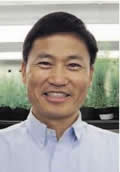 Dr. Jian-Kang Zhu, Professor, Departments of Horticulture and Landscape Architecture and Biochemistry. Dr. Zhu earned his bachelor's degree in soils and agricultural chemistry from Beijing Agricultural University; his master's degree in botany from the University of California, Riverside, and his doctorate in plant physiology from Purdue. He comes to Purdue from the University of California, Riverside, where he was the Jane Johnson Chair Professor in the Institute for Integrative Genome Biology and Department of Botany and Plant Sciences. He is internationally renowned for his creative and path-breaking research that has sought to elucidate the signaling pathways in plants that govern their responses to environmental stresses. His research has contributed fundamentally to current understanding of the molecular-genetic mechanisms underlying salinity tolerance, drought tolerance, and low temperature stress in plants. Dr. Zhu’s laboratory has been central in the effort to identify key genes that could be manipulated to modify crop responses to abiotic stresses, with the ultimate goals of both enhanced agriculture productivity and decreased degradation of the environment.
Dr. Jian-Kang Zhu, Professor, Departments of Horticulture and Landscape Architecture and Biochemistry. Dr. Zhu earned his bachelor's degree in soils and agricultural chemistry from Beijing Agricultural University; his master's degree in botany from the University of California, Riverside, and his doctorate in plant physiology from Purdue. He comes to Purdue from the University of California, Riverside, where he was the Jane Johnson Chair Professor in the Institute for Integrative Genome Biology and Department of Botany and Plant Sciences. He is internationally renowned for his creative and path-breaking research that has sought to elucidate the signaling pathways in plants that govern their responses to environmental stresses. His research has contributed fundamentally to current understanding of the molecular-genetic mechanisms underlying salinity tolerance, drought tolerance, and low temperature stress in plants. Dr. Zhu’s laboratory has been central in the effort to identify key genes that could be manipulated to modify crop responses to abiotic stresses, with the ultimate goals of both enhanced agriculture productivity and decreased degradation of the environment.
Doering named director of Purdue Climate Change Research Center
 Agricultural Economics professor Otto Doering has been named director of the Purdue Climate Change Research Center, the university's interdisciplinary effort focusing on research and education in global climate change. Dr. Doering has years of experience working on the economic analysis of environmental issues and was a member of the Intergovernmental Panel on Climate Change that shared the 2007 Nobel Peace Prize for its work on climate change. His appointment is effective immediately. Dr. Doering had been serving as the center's interim director since October 2009 after succeeding Noah Diffenbaugh, who was named a fellow and professor of the Woods Institute for the Environment at Stanford University.
Agricultural Economics professor Otto Doering has been named director of the Purdue Climate Change Research Center, the university's interdisciplinary effort focusing on research and education in global climate change. Dr. Doering has years of experience working on the economic analysis of environmental issues and was a member of the Intergovernmental Panel on Climate Change that shared the 2007 Nobel Peace Prize for its work on climate change. His appointment is effective immediately. Dr. Doering had been serving as the center's interim director since October 2009 after succeeding Noah Diffenbaugh, who was named a fellow and professor of the Woods Institute for the Environment at Stanford University.
Full story: http://www.purdue.edu/newsroom/faculty/2010/101013DoeringClimateChang.html
Purdue gets $4.88 million grant to study LED lighting of plants
 U.S. Department of Agriculture representatives toured Purdue University greenhouses on October 25 to get a preview of the work that will come from a $4.88 million grant for LED lighting research. Cary Mitchell, professor of horticulture and project director for the grant, said Purdue researchers will collaborate with Rutgers University, the University of Arizona, Michigan State University and Orbital Technologies Corp. on the four-year project to improve and evaluate LED lighting for greenhouse use. The goal is to increase greenhouse yields and decrease producers' energy costs. "The high-intensity discharge lamps used today are inefficient. When you have acres and acres of greenhouses with these lamps in them, it really adds up," Mitchell said. "With LED lighting, we should be able to do as well or better with much less energy."
U.S. Department of Agriculture representatives toured Purdue University greenhouses on October 25 to get a preview of the work that will come from a $4.88 million grant for LED lighting research. Cary Mitchell, professor of horticulture and project director for the grant, said Purdue researchers will collaborate with Rutgers University, the University of Arizona, Michigan State University and Orbital Technologies Corp. on the four-year project to improve and evaluate LED lighting for greenhouse use. The goal is to increase greenhouse yields and decrease producers' energy costs. "The high-intensity discharge lamps used today are inefficient. When you have acres and acres of greenhouses with these lamps in them, it really adds up," Mitchell said. "With LED lighting, we should be able to do as well or better with much less energy."
Full story: http://www.purdue.edu/newsroom/research/2010/101025MItchellGrant.html
Gulf oil spill spurs interest in Indiana shrimp farming
 Indiana's aquaculture industry could help fill a void in shrimp production left by the BP oil spill in the Gulf Coast. Kwamena Quagrainie, aquaculture marketing director for the Department of Agricultural Economics, has received inquiries from people interested in going into shrimp production because of the spill. "People are concerned about the safety and quality of seafood coming from the Gulf," Quagrainie said. "There's something that the aquaculture industry can take advantage of, at least with shrimp, before they fully recover. There's a prospect for Indiana shrimp to fill in some of the gaps."
Indiana's aquaculture industry could help fill a void in shrimp production left by the BP oil spill in the Gulf Coast. Kwamena Quagrainie, aquaculture marketing director for the Department of Agricultural Economics, has received inquiries from people interested in going into shrimp production because of the spill. "People are concerned about the safety and quality of seafood coming from the Gulf," Quagrainie said. "There's something that the aquaculture industry can take advantage of, at least with shrimp, before they fully recover. There's a prospect for Indiana shrimp to fill in some of the gaps."
Full story: http://www.purdue.edu/newsroom/general/2010/101020QuagrainieAquacultu.html
Hedge fun: CD lists all of Indiana's native shrubs
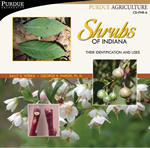 Indiana is home to 117 native shrub species. Every one - from the populous common blackberry to the very rare American barberry - appears in a new Purdue University Cooperative Extension CD. Shrubs of Indiana: Their Identification and Uses is a resource for Master Gardeners, nursery operators and amateur green thumbs interested in learning about or planting native shrubs. Sally Weeks, dendrology laboratory coordinator in the Department of Forestry and Natural Resources, co-authored the CD with George Parker, Professor Emeritus of forestry.
Indiana is home to 117 native shrub species. Every one - from the populous common blackberry to the very rare American barberry - appears in a new Purdue University Cooperative Extension CD. Shrubs of Indiana: Their Identification and Uses is a resource for Master Gardeners, nursery operators and amateur green thumbs interested in learning about or planting native shrubs. Sally Weeks, dendrology laboratory coordinator in the Department of Forestry and Natural Resources, co-authored the CD with George Parker, Professor Emeritus of forestry.
Full story: http://www.purdue.edu/newsroom/general/2010/101014WeeksShrubs.html
E. coli thrives near plant roots, can contaminate young produce crops
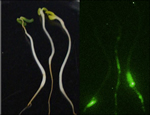 E. coli can live for weeks around the roots of produce plants and transfer to the edible portions, but the threat can be minimized if growers don't harvest too soon, a Purdue study shows. Scientists added E. coli to soil through manure application and water treated with manure and showed that the bacteria can survive and are active in the rhizosphere, or the area around the plant roots, of lettuce and radishes. E. coli eventually gets onto the aboveground surfaces of the plants, where it can live for several weeks. Activity in the rhizosphere was observed using a bioluminescent E. coli created by Dr. Bruce Applegate, Food Science, that glows when active. Dr. Applegate is a co-author on the project.
E. coli can live for weeks around the roots of produce plants and transfer to the edible portions, but the threat can be minimized if growers don't harvest too soon, a Purdue study shows. Scientists added E. coli to soil through manure application and water treated with manure and showed that the bacteria can survive and are active in the rhizosphere, or the area around the plant roots, of lettuce and radishes. E. coli eventually gets onto the aboveground surfaces of the plants, where it can live for several weeks. Activity in the rhizosphere was observed using a bioluminescent E. coli created by Dr. Bruce Applegate, Food Science, that glows when active. Dr. Applegate is a co-author on the project.
Full story: http://www.purdue.edu/newsroom/research/2010/101103TurcoEcoli.html
Talking turkey: Fewer birds means higher Thanksgiving prices
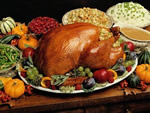 Consumers should count their blessings as they spend a little more for the annual Thanksgiving feast this year because they're likely to face even higher food prices in 2011, says Dr. Corinne Alexander, Agricultural Economics. September's Consumer Price Index indicates that retail food prices are up 1.4 percent from September 2009. "This is what we could consider a fairly modest price increase," she said. "What I would consider a normal or typical food price increase is somewhere around 2.5 percent." Among the holiday staples, turkeys and sweet potatoes will cost more, while retail prices for cranberries and white potatoes will remain stable or be down this season, she said.
Consumers should count their blessings as they spend a little more for the annual Thanksgiving feast this year because they're likely to face even higher food prices in 2011, says Dr. Corinne Alexander, Agricultural Economics. September's Consumer Price Index indicates that retail food prices are up 1.4 percent from September 2009. "This is what we could consider a fairly modest price increase," she said. "What I would consider a normal or typical food price increase is somewhere around 2.5 percent." Among the holiday staples, turkeys and sweet potatoes will cost more, while retail prices for cranberries and white potatoes will remain stable or be down this season, she said.
Full story: http://www.purdue.edu/newsroom/general/2010/101109AlexanderThanksgivi.html
Chromosome imbalances lead to predictable plant defects
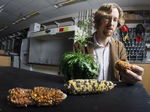 Physical defects in plants can be predicted based on chromosome imbalances, a finding that may shed light on how the addition or deletion of genes and the organization of the genome affects organisms, according to a study involving Dr. Brian Dilkes, Horticulture and Landscape Architecture. The findings identify easily measured characteristics that vary with imbalances of specific chromosomes, said Dr. Dilkes. Understanding why and how those imbalances result in certain characteristics could open the door to correcting those defects in not only plants, but also in animals and humans. A classic example in humans is in Down syndrome, which is caused by an extra copy of chromosome 21.
Physical defects in plants can be predicted based on chromosome imbalances, a finding that may shed light on how the addition or deletion of genes and the organization of the genome affects organisms, according to a study involving Dr. Brian Dilkes, Horticulture and Landscape Architecture. The findings identify easily measured characteristics that vary with imbalances of specific chromosomes, said Dr. Dilkes. Understanding why and how those imbalances result in certain characteristics could open the door to correcting those defects in not only plants, but also in animals and humans. A classic example in humans is in Down syndrome, which is caused by an extra copy of chromosome 21.
Full story: http://www.purdue.edu/newsroom/research/2010/101103DilkesChromosomes.html
Listeria clever at finding its way into bloodstream, causing sickness
 Pathogenic listeria tricks intestinal cells into helping it pass through those cells to make people ill, and, if that doesn't work, the bacteria simply goes around the cells, according to a Purdue study. Dr. Arun Bhunia, Food Science, and Kristin Burkholder, a former Purdue graduate student who is now a postdoctoral researcher in microbiology and immunology at the University of Michigan Medical School, found that listeria, even in low doses, somehow triggers intestinal cells to express a new protein, heat shock protein 60, that acts as a receptor for listeria. This may allow the bacteria to enter the cells in the intestinal wall and exit into a person's bloodstream. Bhunia and Burkholder's findings were published in the early online version of the journal Infection and Immunity.
Pathogenic listeria tricks intestinal cells into helping it pass through those cells to make people ill, and, if that doesn't work, the bacteria simply goes around the cells, according to a Purdue study. Dr. Arun Bhunia, Food Science, and Kristin Burkholder, a former Purdue graduate student who is now a postdoctoral researcher in microbiology and immunology at the University of Michigan Medical School, found that listeria, even in low doses, somehow triggers intestinal cells to express a new protein, heat shock protein 60, that acts as a receptor for listeria. This may allow the bacteria to enter the cells in the intestinal wall and exit into a person's bloodstream. Bhunia and Burkholder's findings were published in the early online version of the journal Infection and Immunity.
Full story: http://www.purdue.edu/newsroom/research/2010/101025BhuniaListeria.html
Brown marmorated stink bug reported in Indiana for first time
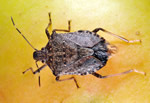 A bug named for its stench and marbled, streaky appearance has made its way to Indiana, potentially becoming a serious pest for homeowners and fruit growers. An insect the Purdue Plant & Pest Diagnostic Laboratory received from a homeowner in Elkhart County in northern Indiana on October 19 was confirmed to be the brown marmorated stink bug, Halyomorpha halys. It is the first record of the bug in Indiana, but it has been found in Ohio and Kentucky. The bug is a native of Japan, Korea and China and was first reported in the United States in Pennsylvania in 1998. It also has been found in other eastern states, including Virginia, Maryland and New Jersey.
A bug named for its stench and marbled, streaky appearance has made its way to Indiana, potentially becoming a serious pest for homeowners and fruit growers. An insect the Purdue Plant & Pest Diagnostic Laboratory received from a homeowner in Elkhart County in northern Indiana on October 19 was confirmed to be the brown marmorated stink bug, Halyomorpha halys. It is the first record of the bug in Indiana, but it has been found in Ohio and Kentucky. The bug is a native of Japan, Korea and China and was first reported in the United States in Pennsylvania in 1998. It also has been found in other eastern states, including Virginia, Maryland and New Jersey.
Full story: http://www.purdue.edu/newsroom/general/2010/101020FosterStinkBug.html
Purdue Extension group hero to farmers
 Lafayette television station WLFI featured Breaking New Ground in its "Heroes Among Us" series for the group's work with and for disabled farmers. The Breaking New Ground Outreach Program, supervised by Dr. Bill Field, Agricultural and Biological Engineering, has been providing assistance to farmers with physical handicaps since 1979.
Lafayette television station WLFI featured Breaking New Ground in its "Heroes Among Us" series for the group's work with and for disabled farmers. The Breaking New Ground Outreach Program, supervised by Dr. Bill Field, Agricultural and Biological Engineering, has been providing assistance to farmers with physical handicaps since 1979.
Full story: http://www.wlfi.com/dpp/community/heroes_among_us/Purdue-Extension-group-hero-to-farmers
Rice hulls a sustainable drainage option for greenhouse growers
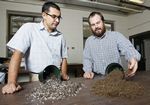 Greenhouse plant growers can substitute rice hulls for perlite in their media without the need for an increase in growth regulators, according to a study done by Dr. Roberto Lopez, Horticulture and Landscape Architecture. Growing media for ornamental plants often consists of a soilless mix of peat and perlite, a processed mineral used to increase drainage. Growers also regularly use plant-growth regulators to ensure consistent and desired plant characteristics such as height to meet market demands. Organic substitutes for perlite like tree bark have proven difficult because they absorb the plant-growth regulators and keep them from getting to the plants. Using bark requires a 25 percent increase in the volume of growth regulators applied.
Greenhouse plant growers can substitute rice hulls for perlite in their media without the need for an increase in growth regulators, according to a study done by Dr. Roberto Lopez, Horticulture and Landscape Architecture. Growing media for ornamental plants often consists of a soilless mix of peat and perlite, a processed mineral used to increase drainage. Growers also regularly use plant-growth regulators to ensure consistent and desired plant characteristics such as height to meet market demands. Organic substitutes for perlite like tree bark have proven difficult because they absorb the plant-growth regulators and keep them from getting to the plants. Using bark requires a 25 percent increase in the volume of growth regulators applied.
Full story: http://www.purdue.edu/newsroom/research/2010/101025LopezHulls.html
Forestry and Natural Resources hosts Senator Lugar
 U.S. Senator Richard G. Lugar visited Purdue on October 20 and spent two hours in the Forestry and Natural Resources Department learning about activities related to forestry. Senator Lugar, a long-time supporter of the Indiana hardwood industry, was briefed on the hardwood scanning project, several initiatives being undertaken by the Hardwood Tree Improvement and Regeneration Center (HTIRC), and the Lugar-Purdue Future of Forestry Program.
U.S. Senator Richard G. Lugar visited Purdue on October 20 and spent two hours in the Forestry and Natural Resources Department learning about activities related to forestry. Senator Lugar, a long-time supporter of the Indiana hardwood industry, was briefed on the hardwood scanning project, several initiatives being undertaken by the Hardwood Tree Improvement and Regeneration Center (HTIRC), and the Lugar-Purdue Future of Forestry Program.
Learning from Leaders brings Vern Hawkins to campus
 On November 11th and 12th, Purdue Agriculture welcomes Vern Hawkins, president of the Syngenta North American (NAFTA) Crop Protection business, based in Greensboro, N.C., as our Learning from Leaders guest. This program launched last April when we hosted Tom Davis of the Meredith Corporation. Learning from Leaders brings to campus the best and brightest stars of agriculture from around the world. Our goal for Learning from Leaders is to expose our students to those who have made their mark in the field of agriculture, share the expertise of the leader with the faculty and staff from the College, and open the door to relationships that can benefit both the leader and Purdue Agriculture. As part of his visit to campus, Mr. Hawkins will give a presentation titled The Keys to Effective Conflict Management as part of the Leadership Certificate Development Program on Thursday, November 11th from 6-8 p.m. in the Dean’s Auditorium of Pfendler Hall.
On November 11th and 12th, Purdue Agriculture welcomes Vern Hawkins, president of the Syngenta North American (NAFTA) Crop Protection business, based in Greensboro, N.C., as our Learning from Leaders guest. This program launched last April when we hosted Tom Davis of the Meredith Corporation. Learning from Leaders brings to campus the best and brightest stars of agriculture from around the world. Our goal for Learning from Leaders is to expose our students to those who have made their mark in the field of agriculture, share the expertise of the leader with the faculty and staff from the College, and open the door to relationships that can benefit both the leader and Purdue Agriculture. As part of his visit to campus, Mr. Hawkins will give a presentation titled The Keys to Effective Conflict Management as part of the Leadership Certificate Development Program on Thursday, November 11th from 6-8 p.m. in the Dean’s Auditorium of Pfendler Hall.
Animal Sciences honors alumni
Six alumni were recognized by the Purdue Department of Animal Sciences at the Distinguished Animal Science Alumni Awards Ceremony on November 5. The awards were presented to three groups of alumni: those who recently graduated, those at the pinnacle of their careers and those who have had a lifetime of achievements. "The purpose of the awards ceremony is to honor Purdue Animal Science alumni who have had exemplary careers," said Alan Sutton, interim department head. "Friends, family and alumni from throughout the state and across campus come together to celebrate the accomplishments of our alumni at the awards program." For more information on the award recipients, click here.
College recognizes scholarship donors and recipients
The College of Agriculture hosted a dinner on October 22 at the Beck Center for scholarship donors and recipients. Twenty-eight donors and 56 students attended. This year, the College was able to award 542 students a total of $852,331 in scholarships. Overall, scholarships awarded at the college and department levels for 2010-2011 totals more than $1.4 million.
Extension Strategic Plan draft ready for review
After many months of work by Extension staff and input from stakeholders across Indiana, the 2011-2015 Purdue Extension Strategic Plan draft is online for review and comments. Click here to read the draft plan and give us your thoughts.
Awards and Recognitions
Special day celebrates Purdue researchers
November 2 was a day in praise of outstanding researchers at Purdue, starting with the annual McCoy Distinguished Lecture and concluding with the Excellence in Research Awards Dinner.
Dr. David Salt, whose work in ionomics as part of the Department of Horticulture and Landscape Architecture shaped a new field of study, presented the McCoy lecture in the afternoon. President France Córdova presented the Herbert Newby McCoy Award, Purdue's most prestigious award for research, to Salt during the Excellence in Research Awards Dinner.
Richard Buckius, vice president for research, and Tim Sands, provost and executive vice president for academic affairs, also recognized research accomplishments by Purdue investigators during the dinner program. For a complete list of Agriculture researchers recognized, click here.
Purdue Research Foundation recognizes university researchers, entrepreneurs
The Purdue Research Foundation honored 51 Purdue University researchers at its annual Inventors Recognition Reception on November 4 in the Herman and Heddy Kurz Purdue Technology Center at the Purdue Research Park. Honorees were recognized for breakthroughs that have resulted, or may soon result, in commercial applications to benefit society. Nine Agriculture faculty members were recognized. For the complete list, click here.
 Udit Minocha, a doctoral student in Food science, is featured in "5 Students Who are Difference-Makers" on the University web site. Udit's doctoral quest has been interrupted twice by military duty calls to Iraq as a member of the National Guard. Udit is on track to receive his doctorate in May 2011.
Udit Minocha, a doctoral student in Food science, is featured in "5 Students Who are Difference-Makers" on the University web site. Udit's doctoral quest has been interrupted twice by military duty calls to Iraq as a member of the National Guard. Udit is on track to receive his doctorate in May 2011.
Ful story:http://www.purdue.edu/fivestudents/difference/minocha.html
Entomology students fare well at OVEA competition
A team of five students and one faculty member from the Department of Entomology traveled to Columbus, Ohio to compete in the Twenty Third Annual Forum of the Ohio Valley Entomological Association (OVEA) on October 29th. Seventeen students from four universities and one high school took part in the competition. Purdue gave five presentations and came home with two awards for current students and two awards for alumni.
Full story: http://www.ag.purdue.edu/entm/Pages/default.aspx
University News
Benefits open enrollment period extended; full service enrollment help available all week
The benefits open enrollment period has been extended through Wednesday, Nov. 24, to allow faculty and staff additional time to access the new online enrollment system and select their 2011 benefits. A full array of resources and assistance is available through this week.
Full story: http://www.purdue.edu/newsroom/purduetoday/faculty_staff_news/2010/101108_BeneUpdate.html
Voluntary Early Partial Retirement Program reinstated
The Voluntary Early Partial Retirement Program (VEPR) has been fully reinstated with no changes. The program was temporarily suspended due to the offering of retirement incentives this fall. Faculty and staff members who wish to request VEPR approval should follow the Business@Purdue protocol to initiate the standard review and decision process. Executive Memorandum C-32, mentioned in the Business@Purdue protocol, can be found at www.purdue.edu/Business/Executive_Memoranda/C/c-32a.html.
Purdue and state officials dedicate northwest Indiana expansion that will create jobs, space for entrepreneurs
Officials on October 19 dedicated a new $2.2 million addition to the Purdue Technology Center that will provide more space and opportunities to attract and retain high-technology jobs in northwest Indiana.The 12,000-square-foot addition brings the Purdue Technology Center to 60,000 square feet. The center, which is located in the Purdue Research Park of Northwest Indiana, opened in 2005 and is home to 16 companies engaged in pharmaceutical sciences, fuel-cell technology, security technology and other fields. About 100 people work in the facility, earning an average annual wage of about $54,000. In addition, another eight companies are center affiliates.
Full story:http://www.purdue.edu/newsroom/research_park_foundation/2010/101019NWIDedication.html
Registration opens for December research and teaching technologies showcase
Registration is open for Purdue CI Days 2010, an event showcasing technology available at Purdue to enhance research, teaching and research funding--from cutting-edge supercomputers to tools for integrating Twitter and Facebook posts into classroom discussions. Purdue CI Days 2010, scheduled for Dec. 8-9, will focus on how just about any faculty member, research staffer, or graduate student can benefit from cyberinfrastructure, or CI. Participants in all fields are welcome. For more information and to register, visit www.itap.purdue.edu/cidays or email cidays@purdue.edu. The registration deadline is Nov. 29.
Mark Your Calendar
November 16: College of Agriculture Administrative/Professional Staff brown bag discussion with Dean Jay Akridge. 12:00 Noon, Pfendler Hall Dean's Auditorium (room 241). Dean Akridge will give an update on the College and then spend time discussing issues or concerns you may have.
November 19: Dean's Advisory Council Fall Meeting, Beck Ag Center.
November 25-26: Thanksgiving Holiday
November 29: President and Provost visit to College of Agriculture
November 30: Agriculture Faculty Meeting, 3:00 p.m., Pfendler Hall Dean's Auditorium
December 13: Final Exam week begins
December 19: Commencement